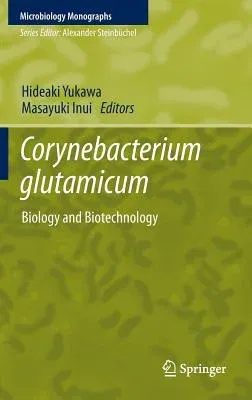Corynebacterium Glutamicum: Biology and Biotechnology (2013)Hardcover - 2013, 14 August 2012

Qty
1
Turbo
Ships in 2 - 3 days
In Stock
Free Delivery
Cash on Delivery
15 Days
Free Returns
Secure Checkout

Part of Series
Microbiology Monographs
Print Length
416 pages
Language
English
Publisher
Springer
Date Published
14 Aug 2012
ISBN-10
3642298567
ISBN-13
9783642298561
Description
Product Details
Book Edition:
2013
Book Format:
Hardcover
Country of Origin:
NL
Date Published:
14 August 2012
Dimensions:
24.03 x
16.1 x
2.74 cm
Genre:
Science/Technology Aspects
ISBN-10:
3642298567
ISBN-13:
9783642298561
Language:
English
Location:
Berlin, Heidelberg
Pages:
416
Publisher:
Series:
Weight:
739.35 gm